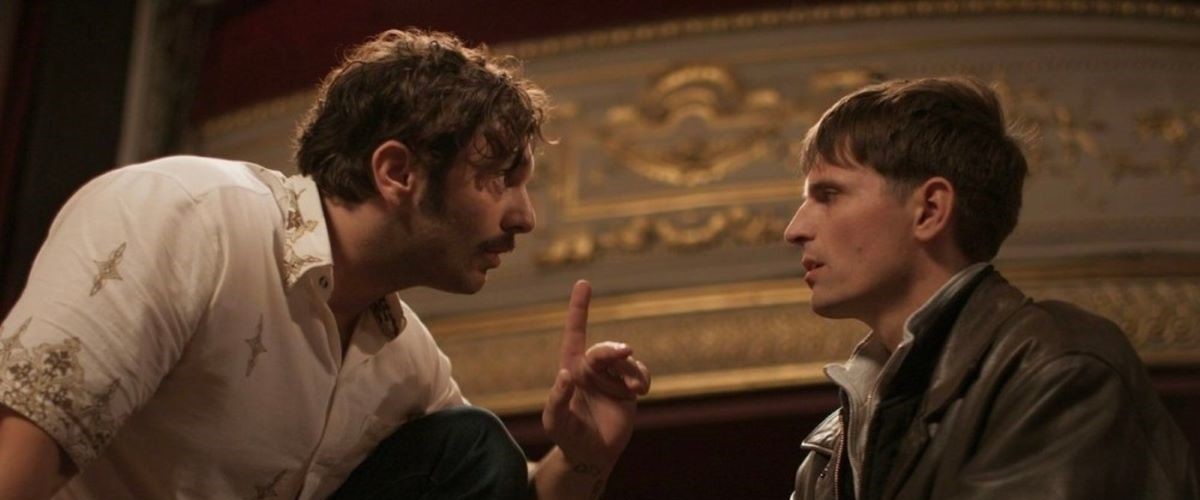Both drawn-out and deceptively simple, the trippy French comedy "Yannick" re-imagines a hostage situation as a surreal and very slow-burning farce. It happens to take place in the middle of a bad stage play. The title character, played by Raphael Quënard, interrupts a bizarre, high-strung divorce comedy called "Le Cocu," or "The Cuckold," which seems to be about an aggrieved husband (Pio Marmaï) and his wife (Blanche Gardin), the latter of whom confesses to having a "platonic" affair with some guy (Sébastien Chassagne) who suffers from "gut trouble."
At first, Yannick's a self-important nuisance. He stops the play cold just to submit his displeasure to both the three actors on stage and his fellow audience members. The play within the play's actors—insecure Paul (Marmaï), inconstant Sophie (Gardin), and insubstantial William (Chassagne)—try to shoo Yannick away, but he won't leave. He pulls out a gun and uses it to make room for himself on stage. The gun is loaded, though that doesn't really matter. It's a lightly held symbol of power. Piggy's got the conch and he holds onto it for a weirdly long amount of time.
In the movie, Yannick's relationship with his fellow audience members is never really clear. That exasperating and often amusing ambiguity is a specialty for the prolific writer/director Quentin Dupieux ("Smoking Causes Coughing"), whose name has become synonymous with this exact sort of stoner-friendly shaggy dog comedy. Yannick's story, such as it is, has no firm shape. He shows up, takes up way too much space, and slowly turns the room against itself. The unspoken but usual rule of social engagement—a half-empty theater audience pays to watch and passively receive whatever's presented to them—is completely ignored. Eventually, Yannick forces Paul and his co-stars to re-do the play, only now it meets Yannick's particular standards. Some members of the theater audience express their displeasure with Yannick. He still gets a standing ovation in the end.
Some early reviews of "Yannick" have understandably described the comedy as "meta," and suggested that it's Dupieux's response to his critics. I'm not really sure how that last part works, not only given where the movie ends up, but also the patience-testing lengths that Dupieux goes to get there. This is a proud timewaster of a comedy and it's pretty amusing as such. Yannick may initially seem obviously unsympathetic, but he winds up charming several audience members anyway. One of them offers to put him up for the night, and nervously adds that he doesn't seem like such a bad guy.
Dupieux doesn't seem interested in either vindicating or excoriating Yannick. Because the play he's interrupted is a boorish, whimsical boulevard comedy, the kind whose audiences should probably expect a certain for-the-cheap-seats style of humor and melodrama. Later in the movie, it's revealed that the building where the entire movie takes place is named Theatre Herbreteau, which is likely a nod to Paris's real-life Théâtre Hébertrot. So when Yannick complains about how long his commute was—or how he only gets so much time off from his job as a car park attendant—he's not setting the stage for a sympathetic backstory. More like a series of hard rug pulls. Imagine if Rupert Pupkin forced meek and maybe even masochistic theatergoers and performers to listen while he airs his personal grievances and also tries out some new material.
It's also worth noting that Paul, Sophie, and William are only so likable, as we see from the early "Le Cocu" scene that Yannick interrupts. They melt down, preen, and laugh whenever Dupieux thinks it would be amusing to continue spinning things out, which is often. Yannick's actions still don't really prove or establish anything, especially in light of the movie's hilariously grim conclusion, filmed in a static long take, as if to emphasize how long we've waited for that finale.
There's never really enough information to see these characters as psychologically complex people. They're more like sitcom characters or sketch comedy stock types since their personalities and mannerisms are mostly dependent on whatever the situation is chaotically becoming at any given moment. Dupieux doesn't really care about closure, as many viewers already know if they're going to see a movie because it says "Quentin Dupieux" on the poster. Everyone else should be forewarned that the jokes in "Yannick" are often on the viewers since so much time and effort has been devoted to frustrating our expectations.
If anything, the most consistent thing about "Yannick" is how unsustainable its tone and narrative is from scene to scene. Dupieux's latest will either annoy or charm you depending on how much you appreciate being led around by the nose by a filmmaker and a cast of characters who seem pretty committed to jerking you around.




















